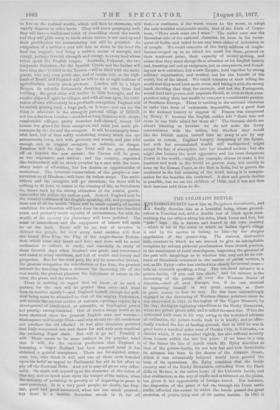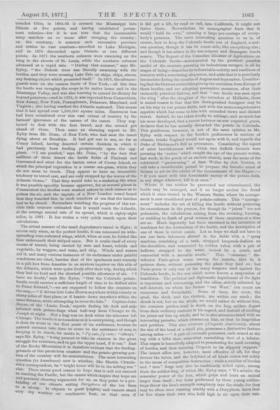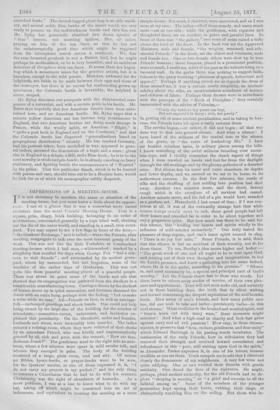THE COLORADO BEETLE.
ENTOMOLOGISTS know him as Doryphora decemlineata, and fondly describe him as a beautiful being, whose ground- colour is Venetian red, with a double row of black spots orna- menting the ten stripes along his sides, black knees and feet, but " pale " legs. lie is known and feared in his own country —which is his in the sense in which an Indian tiger's village is said by the natives to belong to him—by the simpler appellation of the potato-beg. The curious, destructive little creature to which wo are warned to give an inhospitable reception by solemn pictorial proclamation from church porches, to the amazement of rural churchgoers, inspecting the pictures of the pest with misgivings as to whether this may not be an out- burst of Ritualistic ornament in the matter of parish notices, is not, as Mr. Ityley—who has studied him closely for several years— tells us, correctly speaking, a bug. The ten-lined nuisance is a potato-beetle, "if you call him short," and his mission is the devouring of the potato all over the Western States of America,—and all over Europe, too, if he can succeed in importing himself in any groat numbers, as there is grave reason to fear he may. Ile has been unremittingly engaged in the devouring of Western•States potatoes since he was discovered in 1824, in the region of the Upper Missouri, by Mr. Say, during an exploring expedition to the Rocky Mountains, where the potato grows wild, and is called the sand-bur. W hen the cultivated bulb came in his way, owing to the westward advance of civilisation, the potato-beetle took to it kindly, and so effec- tually tracked the line of feeding-ground, that in 1859 he was in great force a hundred miles west of Omaha City, in Nebraska,—a district which, if we remember rightly, has also suffered severely from locusts within the last few years. If we trace on a map of the States the line of march which Mr. Ryley describes as that of the potato-beetle, we see how fast and how formidable its advance has been to the shores of the Atlantic Ocean, which it was erroneously believed would have proved the term of its operations. Mr. Ryley considers that the fertile country east of the Rocky Mountains, extending from the Black Hills to Mexico, is the native home of the Colorado beetle, and that civilisation, in the way of traffic and settlement on the plains, has given it the opportunity of foreign .travel. For instance, the dispersion of the plant it fed on, through the Texas cattle traffic, afforded the means by which the beetle passed the great stretches of prairie lying east of its native haunts, In 1861 it invaded Ohio, in 1864.65 it crossed the Mississippi into Illinois at five points, and having established perma- nent colonies—for it is not true that the innumerable army marches on en mane after ravaging the country ; on the contrary, it annexes each successive province and settles in vast numbers—travelled to Lake Michigan, and in 1870 descended upon Ontario at two different points. In 1871 the southern columns were swarming on the wing in the streets of St. Louis, while the northern columns advanced at a rapid rate. " During that summer," says Mr. Ryley, " the Detroit river was literally swarming with the beetles, and they were crossing Lake Erie on ships, chips, staves, any floating object which presented itself." In 187a, the advance- guards were on the 'eastern limits of New York,—all this time the beetle was ravaging the crops in its native home and in the Mississippi Valley, and was also learning to extend its dietary far beyond potatoes,—and in 1874, it was reported from Connecticut, New Jersey, New York, Pennsylvania, Delaware, Maryland, and Virginia ; also having reached the Atlantic seaboard. This means that it bad spread over 1,500,000 square miles. Enormous loss had been occasioned over this vast extent of country by the farmers' ignorance of the nature of the insect. They neg- lected to deal with the first brood, and the second got ahead of them. Then came an alarming report to Mr. Ryley from Mr. Dean, of New York, who had seen the insect flying about at Brooklyn. It bad got out to sea, so far as Coney Island, having deserted certain districts in which it had previously been feeding prosperously upon the egg- plant. " I am puzzled," says Mr. Dean, " by the fact that millions of them desert the fertile fields of Platbush and Gravesend and steer for the barren acres of Coney Island, on which the principal vegetation is a coarse sea-grass, which they do not seem to touch. They appear to have an irresistible tendency to travel east, and are only stopped by the waves of the Atlantic Ocean." That they would take to a seafaring life when it was possible speedily became apparent, for at several places in Connecticut the beetles were washed ashore in such masses as to poison the air, and the captain of a New London vessel found that they boarded him in such numbers at sea that the hatches had to be closed. Naturalists watching the progress of this ter- rible little creature estimated that it would reach the Atlantic, at the average annual rate of its spread, which is eighty-eight miles, in 1881. It has stolen a very quick march upon their calculations.
The actual manner of the small depredator's travel is flight ; it moves only when, as the perfect beetle, it can command its wide- spreading rose-coloured wings, which, when at rest, lie folded like fans underneath their striped cases. But it avails itself of every means of transit, being carried by man and beast, vehicle and -vegetable, by waggon, and train, and ship. Winds and waters aid it, and many curious instances of its endurance under painful conditions are cited, besides that of the specimens sent recently in a pill-box from America to an anxious inquirer on this side of the Atlantic, which were quite lively after their trip, during which they had no food and the shortest possible allowance of air. " I have no doubt," says Mr. Ryley, "that the Colorado potato- beetle could survive a sufficient length of time to bo drifted alive to Point Edward,"—we are supposed to follow the creature on the map,_„
if driven into Lake Huron anywhere within twenty or
thirty miles of that place, or if beaten down anywhere within the same distance, while attempting to cross the lake." Captain John Boyne, of the ' Lizzie Doak,' reports finding his deck and saijs infested with potato-bugs when half-way from Chicago to St. Joseph at night. Not a bug was on deck when the schooner left Chicago. The beetle is as tenacious as it is enterprising, and though it does its worst in the first years of its settlement, because its natural enemies take time to come to the assistance of man in keeping it in check, its motto is, "J'y suis, j" y rests ; "always," says Mr. Ryley, " being present to take its chances in the great struggle for existence, and to get the upper hand, if it can." East of the Rocky Mountains it is therefore evident that the feeding- grounds of this pernicious creature and the potato-growing por- tion of the country will be conterminous. The most interesting question (to Americans) now is whether, like Martin Chazzle- wit's correspondent, its " bright home will be in the setting sun " also. There seems good reason to hope that it will not succeed in reaching the Pacific, but the causes which inspire that hope are not precisely cheering arguments for us, as they point to a pro- bability of our climate suiting Doryphora of the ten lines to a nicety. it objects to great imights,' and cannot stand very dry weather or continuous heat, so that oven if it did get a. lift, by road or rail, into California, it might not thrive there. -Nevertheless, its monographer fears that it would "hold its own," meaning a large per-tentage of every- body's potatoes. The most interesting question to us is, of course, how to keep the Colorado beetle out of England, a seri- ous question, though it has its comic side, like everything else ; and though it has arisen in the sea-serpent and Ramsgate Sands season. The Report of the Canadian Minister of Agriculture on the Colorado beetle—accompanied by the prettiest possible model of the creature pursuing its industrious ravages, in all its stages of being—describes its indomitable activity and readiness of resource with a convincing eloquence, and adds that it is peculiarly locomotive during the months of August and September. Consider- ing that the German authorities give up the exclusion from Europe of these beetles, and are adopting preventive measures, after their eminently practical fashion, and that " one beetle was seen upon the wing " after the slaughter of the intruders at Ithilheim, there is sound reason to fear that this distinguished foreigner may be on his way to our potato-fields, and with the more comprehensive appetite which has come to him with extended views and distant travel. Indeed, he has taken kindly to cabbage, and so much has his menu developed, that a recent lecturer on our expected guest, declares that he has actually discarded the potato in Colorado. This gentleman, however, is not of the same opinion as Mr. Ryley with respect to the beetle's preferences in matters of climate, thinks England would not agree with it, and regards the Duke of Richmond's Bill as premature. Considering the aspect of utter bewilderment with which two Suffolk farmers were perusing the notice' which caught the eye of the present writer, last week, in the porch of an ancient church, near the scene of the celebrated " gammoning " of Sam Weller by Job Trotter, it will take a considerable period to prepare the bucolic mind of Britain to act on the advice of the Government of the Hague :- " If you meet with this formidable enemy of the potato-field, in any shape whatever, kill it at once."
Where it can neither be prevented nor exterminated, the beetle may be managed, and it no longer excites the dread which it once caused in the Western States, where its manage- ment is now considered part of potato-culture. This " manage- ment " includes the art of killing the beetle without poisoning its executioners in the process, for though its " juices " are not poisonous, the exhalations arising from the crushing, burning, or scalding to death of great masses of these creatures at a time are so. Much ingenuity has been exercised in the invention of machines for the destruction of the beetle, and the description of one of these is rather comic. Lot us hope we shall not have to see our farm labourers abroad in the fields with a "spray machine, consisting of a tank, strapped knapsack-fashion on the shoulders, and connected by rubber tubes with a pair of bellows, strapped to the waist, turned by a crank, and connected with a movable nozzle." This "atomiser " dis- tributes Paris-green water among the insects, that is, it poisons them, without poisoning the plant they feed on ; but Paris-green is only one of the many weapons used against the Colorado beetle, in the war which never knows a suspension of hostilities. The political and diplomatic department of the fight is important and interesting, and the allies, strictly actuated by self-interest, on which the farmer "out West" can count are numerous and formidable. Some of them, the crow, the quail, the duck, and the chicken, are within our reach ; the skunk is not, but on the whole, we would rather do without him, the common garden-toad is death ou the bug, spiders depart from their ordinary customs in his regard, and instead of sucking his juices eat him up whole, and lie is also accommodated with an interesting parasite, which swarms on him, so that he languishes and perishes. This nice creature (Uropoda Americana), about the size of the head of a small pin, possesses a distinctive feature among mites :—" A pair of extensile processes, each armed at the top with a bifid claw, somewhat resembling that of a lobster. This organ is beautifully adapted to penetrating the hard covering of beetles, and thus securing Uropoda to its slippery support." The insect allies are, however, most effective of all, for they devour the larva', and the ladybird of all kinds comes out nobly in the cause of competitive destruction ; while a number of beetles and " true" bugs may also be confidently relied upon, among them the soldier-bug, of which Mr. Ryley says, " We admire the muscular power of the lion, which grips and tears an animal larger than itself ; but feats performed by these young soldier- bugs throw the lion's strength completely into the shade, for they may be often seen running nimbly with a Doryphora larva four or five times their own size, held high in air upon their out-
stretched beaks." The dotted-legged plant-bug is an able auxili- ary, and several noble flies, hawks of the insect world, are ever ready to pounce on the multitudinous beetle and thin him out. Mr. Ryley has personally observed two dozen species of " true " insects, not counting spiders, flies, or
preying on him of the ten lines, so that he has not the uninterruptedly good time which might be supposed from his triumphant march across a continent. We fear the rose-breasted grosbeak is not a British bird, but he might perhaps be acclimatised, as he is very beautiful, and an assiduous devourer of Doryphora with ten lines. It seems there is a bogus- bug which is sometimes taken for the genuine article, but it is harmless, except to the wild potato. Mistakes, awkward for the ladybirds, are liable to be made between their eggs and those of the destroyer, but there is no excuse for confounding grown-up specimens ; the Colorado beetle is invariably, the ladybird is never, striped.
Mr. Ryley discusses our prospects with the disinterested com- posure of a naturalist, and with a certain pride in his beetle. Mr. Bates says hopefully that few American insects have been natu- ralised here, and no American beetle. Mr. Ryley urges that a minute yellow American ant has become very troublesome in England, that two American beetles are doing much damage in France, while the woolly aphis, or American "Blight," is " quite a pest both in England and on the Continent," and that the Colorado beetle has dispersed " generalisations based on geographical distribution " already. IIe has reached Germany, had his portrait taken, been modelled in wax, appeared in gene- ral orders, assumed the dimensions of a topic and a scare ; given rise in England to a debate, a Bill, and a Blue-book ; he is to be the next novelty in studs and pin-heads; he is already crawling on fancy stationery, and figuring beside the announcements of " Wanted" by the police. That this particular Snark, which is to be hunted with poison and care, should turn out to be a Boojum here, would Be hick for us of which his monographer mildly desponds.
































 Previous page
Previous page